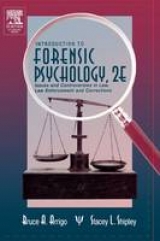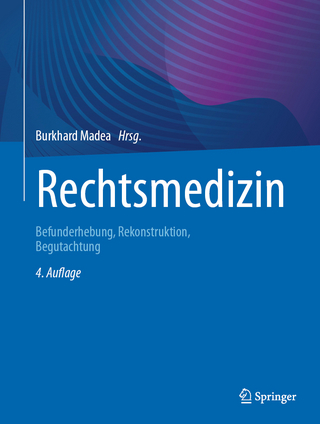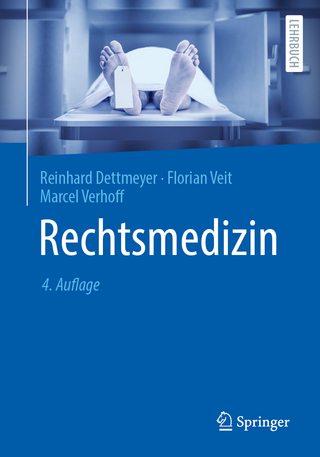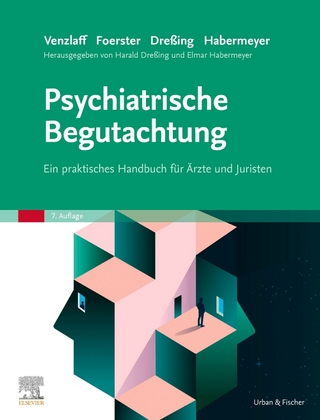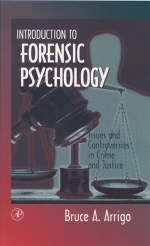
Introduction to Forensic Psychology
Academic Press Inc (Verlag)
978-0-12-064350-9 (ISBN)
- Titel erscheint in neuer Auflage
- Artikel merken
Introduction to Forensic Psychology is an original approach to understanding how psychologists impact the research, practice, and policy of crime, law, and justice. Written specifically for students, lay professionals, and practitioners, the text systematically examines police, court, and correctional aspects of forensic psychology. By further subdividing the text into the adult, juvenile, family, and civil components of forensic psychology, the author brings interdependence and overlap among these dimensions and the three broad thematic areas themselves into sharp, clear, and compelling focus. Contained within each of the 12 substantive chapters are series of timely issues or controversies that provocatively capture the significance of these relationships. Selected topics include incarceration of the mentally ill, the police as mediators in prison, competency to stand trial, treatment refusal rights, police stress and suicide, and sex offender treatment. Introduction to Forensic Psychology: Issues and Controversies in Crime and Justice presents the debates about psychology, crime, law, and the intersections in an accessible, jargon-free fashion.
It is a cross-disciplinary text relevant to the fields of psychology, law, criminal justice, social work, and public policy.
Bruce A. Arrigo is Professor of Criminology and Forensic Psychology and Director of the Institute of Psychology, Law, and Public Policy at the California School of Professional Psychology-Fresno. Prior to his career in academe, he was a community organizer and social activist for the homeless, the mentally ill, the working poor, the frail elderly, and the chemically addicted. He is the author of more than 60 journal articles, academic book chapters, and scholarly essays exploring theoretical and applied topics in critical criminology, criminal justice and mental health, and the sociology of law. His recent scholarship has appeared in such periodicals as Criminal Justice and Behavior; Crime, Law, and Social Change; Justice Quarterly; International Journal of Law and Psychiatry; Critical Criminology; Journal of Offender Rehabilitation; Social Justice; Law and Psychology Review; and the International Journal for the Semiotics of Law. He is the author, co-author, or editor of four books. His most recent book-length projects include Madness, Language, and the Law (1994); The Contours of Psychiatric Justice (1996); Social Justice/Criminal Justice: The Maturation of Critical Theory in Law, Crime, and Deviance (1998); and, with T.R. Young, The Dictionary of Critical Social Science (1999). Professor Arrigo is also the editor of the peer-reviewed quarterly Humanity and Society and the founding editor of the periodical Journal of Forensic Psychology Practice.
About the Author.; Acknowledgments.; Preface.; Part I: Police and Law Enforcement; Adult Forensics; Overview. Power, Authority, and Discretionary Decision Making.; Use of Force.; Evidence Tampering.; Adult Criminal Profiling.; Coerced Confessions.; Juvenile Forensics; Overview.; Dealing with Troubled Youths.; Policing Juvenile Gangs.; Juveniles' Attitudes toward the Police.; Adolescent Female Prostitutes: Criminals or Victims?; Civil Forensics; Overview.; Public Attitudes toward Police.; Exploring the Police Personality.; Police and the Mentally Ill.; Community Policing: Trendy or Effective?; Police Training: Communications Skills and Conflict Resolution. Policing Minority Populations.; Family Forensics:; Overview. Police as Mediators in Domestic Disputes. Police Stress. Police Work and Family Stress. Homosexual Police Officers. Part II: Court and the Legal System; Adult Forensics; Overview. Plea Bargaining. Competency to Stand Trial. Jury Selection. Psychological Tests and Forensic Assessment Instruments in the Courtroom. Risk Assessment. Forensic Verdicts or Psychiatric Justice: NGRI and GBMI. Juvenile Forensics; Overview. Defining the Age of Criminal Responsibility. Children/Juveniles and the Reliability of Their Courtroom Testimony. Best Interests of the Child Doctrine. Sentencing: Psychology of Juvenile Rehabilitation. Civil Forensics:; Overview. Defining Mental Illness. Right to Refuse Treatment. Least Restrictive Alternative Doctrine. Duty to Inform vs Client Confidentiality. Victim Compensation Programs. Victim-Offender Mediation. Family Forensics; Overview. Family Trauma and the Cycle of Crime. Family Violence: Homocide. Impact of Mental Health Law Doctrines on Families; Paternalism and Parens Patriae. Family Law and Emotional Rights. Domestic Violence. Gay/Lesbian Rights and Definitions of the Family. Part III: Corrections and Prison Practices; Adult Forensics; Overview. Offender's Right to Refuse Treatment. Incarcerating and Executing the Mentally Ill. Sex-Offender Treatment. Electronic Monitoring: Technology and Managing Offenders. Prison Violence. Underground Economy of Prison. Juvenile Forensics; Overview. Juveniles in Adult Jails. Juveniles on Death Row. Juvenile Boot Camp. Suicide among Incarcerated Juveniles. Incarceration of Status Offenders. Civil Forensics; Overview. Psychological Stress and Correctional Work. Community Corrections. Mentally Disabled Inmates. Society's Reaction to Sex Offenders. Women Working in Male Prisons. Inmate Sexuality. Family Forensics; Overview. ""Make-Believe"" Families. Pregnant Women in Prison. Female Prisoners and Mother-Child Separation. Other Family Members of Inmates. Female Inmates: Mothers in Prison. References. Index.
| Erscheint lt. Verlag | 27.1.2000 |
|---|---|
| Verlagsort | San Diego |
| Sprache | englisch |
| Maße | 152 x 229 mm |
| Gewicht | 645 g |
| Themenwelt | Geisteswissenschaften ► Psychologie |
| Studium ► 2. Studienabschnitt (Klinik) ► Rechtsmedizin | |
| ISBN-10 | 0-12-064350-2 / 0120643502 |
| ISBN-13 | 978-0-12-064350-9 / 9780120643509 |
| Zustand | Neuware |
| Haben Sie eine Frage zum Produkt? |
aus dem Bereich
